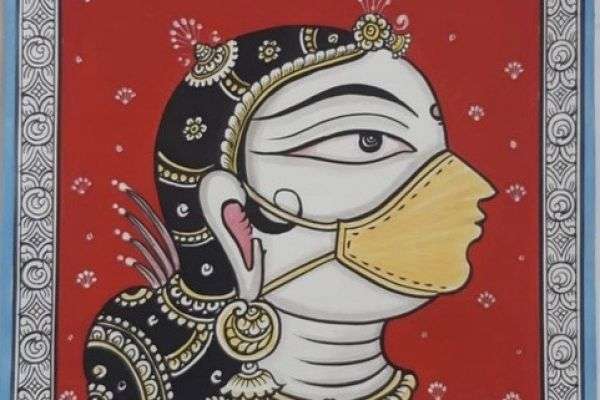
- This event has passed.

COVID Lady by Apindra Swain (cropped)
Hear two lectures on Zoom about “Why Photography as Art in India Matters More than Ever” and “Portraying the Pandemic for Posperity”. These lectures will be chaired by Tarun Nagesh, Curator, Asian Art (QAGOMA).
WHY PHOTOGRAPHY AS ART IN INDIA MATTERS MORE THAN EVER
This talk will discuss the multiple strategies mobilised by contemporary photography collectives that draw from modes of visual expression of the “documentary” as well as the “vernacular” to respond to the current conditions of globalisation, neo-liberalism, social inequity, and now the COVID-19 pandemic in the Indian post-colony. Through the complex interaction between their art and activism, these groups, including the PEP Collective, the Dalit Camera, and the Kashmir Photo Collective renew and reinvent the medium of photography, reintroducing a political consciousness to the critical reception of their images.
Sushma Griffin is projects’ curator and research assistant at the University of Queensland’s Node of the Australian Research Council Centre of Excellence for the History of Emotions. She has just completed a PhD in Art History at the University of Queensland which considers how the colonial photograph mediated Indian and British conceptualisations of the relation between image and world.
PORTRAYING THE PANDEMIC FOR POSTERITY
COVID as a crisis or opportunity?? The grim reality of the COVID crisis has engulfed much of the world today. In India, life has been greatly impacted by the several months long strict lockdown. Given the density of population in this country, the poverty and economic and social inequality and barriers, it has been no easy task keeping the virus at bay. There has been a devastating migration of thousands of migrant labour walking thousands of kilometres home with people dying of hunger, thirst and tiredness. India has truly been a country under siege.
COVID INSPIRED FOLK AND TRIBAL ART FROM INDIA PROJECT, 2020 began as a way of inspiring folk and tribal artists to continue their work under very trying circumstances. The idea was to keep the artists creatively inspired and generate some income for them by finding museums and collectors who would buy these artworks. With the lockdown, the artists can no longer come to the cities to participate in exhibitions and shows nor can tourists go to the artists anymore.
Folk and tribal artists across India have responded to the project very positively. They have depicted the crisis in their own unique ways. Their evocative works serve not just as a record of the havoc the virus is creating but also serve to educate people about safe practices. Some artworks introduce a touch of whimsy in these bleak times. All in all, these amazing artworks live up to the promise of the role art can play in human life – offering something to enlighten, to entertain, to be savoured, to be remembered. These artworks are memory keepers, recording this unique moment in world history for posterity.
Minhazz Majumdar is a writer and curator whose passion is Indian folk and tribal art. She has worked on several path-breaking exhibitions about India in museums across the UK, USA and Australia, including Kalpavriksha for APT 8.
HOW TO REGISTER: Registration (only available to current TAASA members) closes October 16th. Please email Mandy Ridley (taasa.qld@gmail.com) before then to receive your link to Zoom. Registered participants will be sent the link a day or two before the lecture. If you have not used Zoom before, there is no need to download it in advance. Just follow the prompts after you click on the link that will be sent to you upon registration and your device will download and connect you to Zoom.